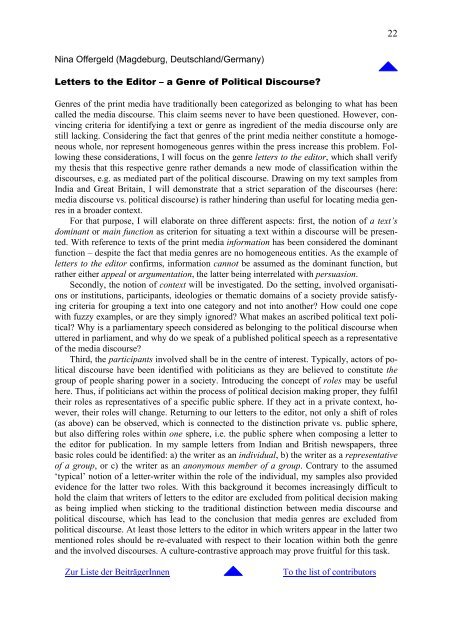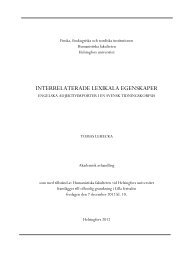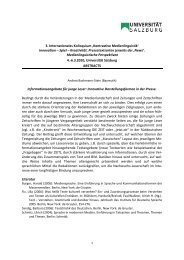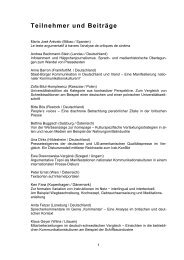Abstracts - Kontrastive Medienlinguistik
Abstracts - Kontrastive Medienlinguistik
Abstracts - Kontrastive Medienlinguistik
Sie wollen auch ein ePaper? Erhöhen Sie die Reichweite Ihrer Titel.
YUMPU macht aus Druck-PDFs automatisch weboptimierte ePaper, die Google liebt.
Nina Offergeld (Magdeburg, Deutschland/Germany)<br />
Letters to the Editor – a Genre of Political Discourse?<br />
Genres of the print media have traditionally been categorized as belonging to what has been<br />
called the media discourse. This claim seems never to have been questioned. However, convincing<br />
criteria for identifying a text or genre as ingredient of the media discourse only are<br />
still lacking. Considering the fact that genres of the print media neither constitute a homogeneous<br />
whole, nor represent homogeneous genres within the press increase this problem. Following<br />
these considerations, I will focus on the genre letters to the editor, which shall verify<br />
my thesis that this respective genre rather demands a new mode of classification within the<br />
discourses, e.g. as mediated part of the political discourse. Drawing on my text samples from<br />
India and Great Britain, I will demonstrate that a strict separation of the discourses (here:<br />
media discourse vs. political discourse) is rather hindering than useful for locating media genres<br />
in a broader context.<br />
For that purpose, I will elaborate on three different aspects: first, the notion of a text’s<br />
dominant or main function as criterion for situating a text within a discourse will be presented.<br />
With reference to texts of the print media information has been considered the dominant<br />
function – despite the fact that media genres are no homogeneous entities. As the example of<br />
letters to the editor confirms, information cannot be assumed as the dominant function, but<br />
rather either appeal or argumentation, the latter being interrelated with persuasion.<br />
Secondly, the notion of context will be investigated. Do the setting, involved organisations<br />
or institutions, participants, ideologies or thematic domains of a society provide satisfying<br />
criteria for grouping a text into one category and not into another? How could one cope<br />
with fuzzy examples, or are they simply ignored? What makes an ascribed political text political?<br />
Why is a parliamentary speech considered as belonging to the political discourse when<br />
uttered in parliament, and why do we speak of a published political speech as a representative<br />
of the media discourse?<br />
Third, the participants involved shall be in the centre of interest. Typically, actors of political<br />
discourse have been identified with politicians as they are believed to constitute the<br />
group of people sharing power in a society. Introducing the concept of roles may be useful<br />
here. Thus, if politicians act within the process of political decision making proper, they fulfil<br />
their roles as representatives of a specific public sphere. If they act in a private context, however,<br />
their roles will change. Returning to our letters to the editor, not only a shift of roles<br />
(as above) can be observed, which is connected to the distinction private vs. public sphere,<br />
but also differing roles within one sphere, i.e. the public sphere when composing a letter to<br />
the editor for publication. In my sample letters from Indian and British newspapers, three<br />
basic roles could be identified: a) the writer as an individual, b) the writer as a representative<br />
of a group, or c) the writer as an anonymous member of a group. Contrary to the assumed<br />
‘typical’ notion of a letter-writer within the role of the individual, my samples also provided<br />
evidence for the latter two roles. With this background it becomes increasingly difficult to<br />
hold the claim that writers of letters to the editor are excluded from political decision making<br />
as being implied when sticking to the traditional distinction between media discourse and<br />
political discourse, which has lead to the conclusion that media genres are excluded from<br />
political discourse. At least those letters to the editor in which writers appear in the latter two<br />
mentioned roles should be re-evaluated with respect to their location within both the genre<br />
and the involved discourses. A culture-contrastive approach may prove fruitful for this task.<br />
Zur Liste der BeiträgerInnen To the list of contributors<br />
22





